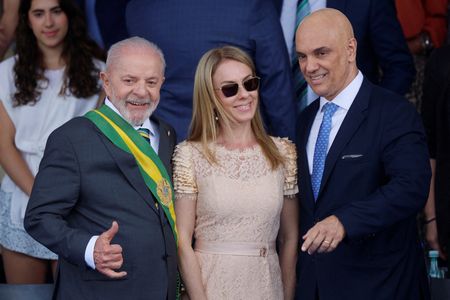By Gram Slattery
WASHINGTON (Reuters) -The U.S. on Monday imposed sanctions on the wife of the judge who presided over the criminal case of right-wing former President Jair Bolsonaro and also yanked the visas of six high-ranking officials, escalating a showdown between the Trump administration and the Brazilian government.
Widening the penalties targeting Brazil's judiciary, President Donald Trump's administration imposed sanctions on Viviane Barci de Moraes, the wife of Supreme Court Justice Alexandre de Moraes, under authorities provided by the Global Magnitsky Act, the U.S. Treasury Department said.
It also imposed sanctions on the Lex Institute, a financial entity controlled by Barci de Moraes and other family members. The U.S. government believes the Lex Institute could serve as a vehicle to evade pre-existing sanctions, a senior administration official said.
The new sanctions underline Trump's use of financial penalties for political ends. In the past, Magnitsky Act sanctions have been reserved for those deemed guilty of corruption or human rights abuses.
Shortly after the new sanctions were made public, U.S. Treasury Secretary Scott Bessent told reporters that additional Brazilian officials could be sanctioned if the administration deems it necessary.
Brazil's government called the U.S. action an attack on its sovereignty and said it "will not bend to yet another aggression." Moraes issued a statement saying "the illegal and regrettable application" of Magnitsky to his wife violates international law, Brazilian sovereignty and the independence of the judiciary.
Barci de Moraes' law firm did not immediately respond to a request for comment.
Moraes presided over the criminal case of former President Jair Bolsonaro, who was convicted this month of attempting a coup to stay in power after he lost the 2022 election to current leftist President Luiz Inacio Lula da Silva. He was sentenced to 27 years in prison.
Bolsonaro's lawyers plan to appeal the conviction, although jurists say their chances of success are remote.
Also on Monday, Brazilian lawmaker Eduardo Bolsonaro was charged with coercion, in a case linked to the one in which his father was convicted for plotting a coup.
Moraes himself was hit with Magnitsky sanctions in July.
The Trump administration has accused De Moraes of weaponizing courts, authorizing arbitrary pre-trial detentions, and suppressing freedom of expression, charges the Brazilian government denies.
DIPLOMATIC CRISIS
The latest sanctions represent a deepening of an ongoing diplomatic crisis between the Western Hemisphere's two largest democracies.
Trump and his political allies dismiss the criminal case against Bolsonaro as a political witch-hunt. The U.S. president, who was himself criminally indicted for trying to stay in power following his 2020 election loss to former President Joe Biden, has frequently indicated that he sees the former Brazilian leader as a kindred spirit.
In July, the Trump administration canceled U.S. visas held by Moraes and several other Brazilian Supreme Court justices. The U.S. also hit Brazil with a 50% tariff on most goods.
Separately, a senior Trump administration official told Reuters the U.S. was revoking Brazilian Solicitor-General Jorge Messias' visa, as well as the visas of five additional Brazilian judicial officials, three of them current or former Moraes aides.
Messias criticized the new measures in a post on X. "The latest measures applied by the U.S. government against Brazilian authorities and their family members deepens an unfounded series of unilateral actions, totally incompatible with the peaceful and harmonious management of diplomatic and economic relations," he wrote.
AMNESTY FOR BOLSONARO, RIOTERS?
The new sanctions also are meant to target what the Trump administration alleges is a broad censorship regime in Brazil, spearheaded by Moraes and aimed at conservatives, including some legal U.S. residents.
Brazil denies any such censorship regime exists, and many Democrats and Western leaders see U.S. sanctions as an example of bullying directed at a nation that should be a major hemispheric ally.
Freedom of speech has been a significantly more circumscribed right in Brazil than in the U.S., and various forms of racist or hate speech or comments seen as attacks on democratic institutions can be considered criminal offenses.
In recent years, Moraes and other judicial officials have ordered social media profiles to be removed via often secret orders and instigated probes into public figures, among other measures. That has led to high-profile feuds with major social media platforms, including Elon Musk's X.
Moraes' critics say such moves represent an erosion of due process. His defenders say he is protecting Brazil's democracy - which emerged from military dictatorship just 40 years ago.
The Trump administration is closely watching an amnesty bill in Brazil's Congress, which could provide relief to Bolsonaro, his accomplices and pro-Bolsonaro demonstrators involved in a Jan. 8, 2023, attack on government buildings, the senior administration official said.
Lawmakers voted by a large margin last week to fast-track a vote on that bill.
The Trump administration strongly prefers full amnesty for all relevant actors, Bolsonaro included, the official said. Full amnesty is a precondition for lifting sanctions, the official added, assuming that the Brazilian Supreme Court does not stymie that effort.
Court officials have indicated that Congress does not have the constitutional power to pardon Bolsonaro for his crimes, meaning a future showdown between Brazil's legislative and judicial branches is possible.
In the call on Monday with reporters, Bessent warned that financial institutions dealing with the sanctioned officials could also be in Washington's crosshairs.
"Any Brazilian financial institution that deals with sanctioned individuals, they should also consider those actions carefully," he said.
(Reporting by Gram Slattery; Additional reporting by Ricardo Brito in Brasilia, Gabriel Araujo in Sao Paulo, and Andrea Shalal and David Lawder in Washington; Editing by Aurora Ellis, Daniel Wallis, Patricia Zengerle and Don Durfee)







